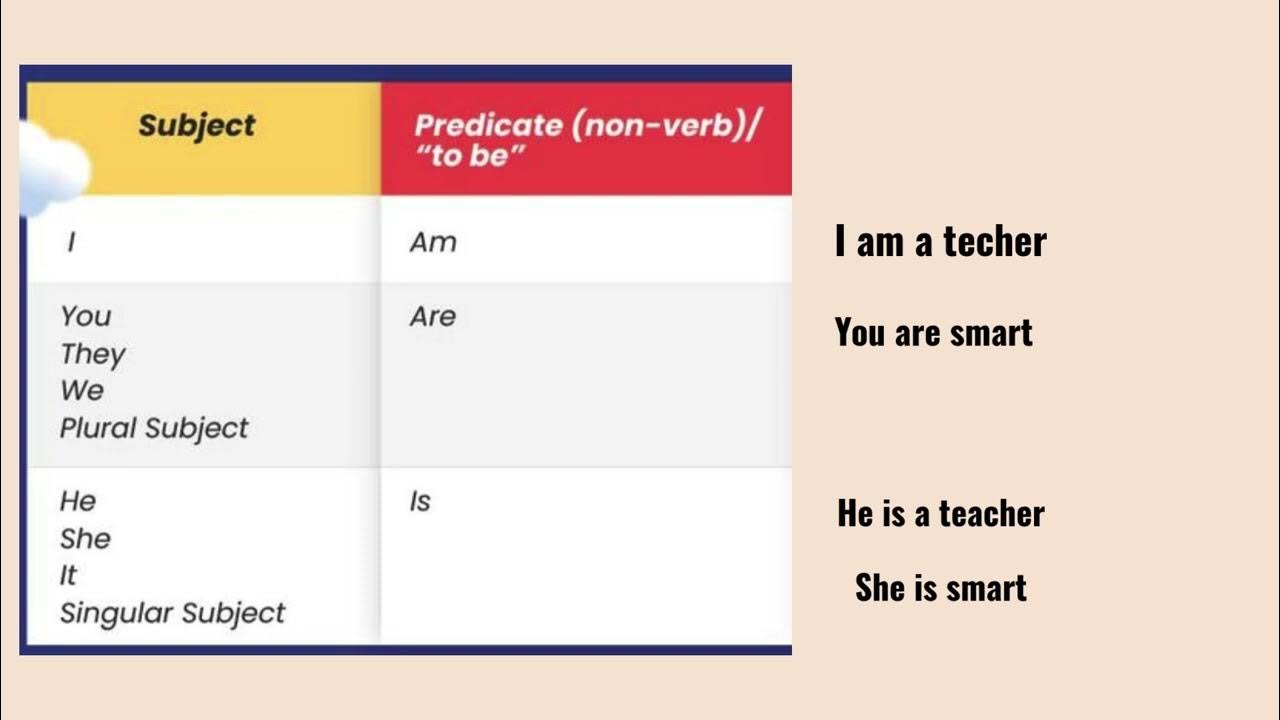TO BE WAS WERE - NOMINAL SENTENCE SIMPLE PAST TENSE
Summary
TLDRThis English lesson focuses on the use of the auxiliary verbs 'was' and 'were' in the simple past tense. The instructor explains when to use 'was' (for singular subjects) and 'were' (for plural subjects), with clear examples for positive, negative, and interrogative sentences. The lesson includes practical exercises to reinforce understanding, helping learners construct correct sentences related to past events. The content is designed for ESL students, providing foundational grammar skills for effective communication in the past tense.
Takeaways
- 😀 The lesson focuses on the use of 'was' and 'were' in the simple past tense.
- 😀 'Was' is used with singular subjects (I, he, she, it).
- 😀 'Were' is used with plural subjects (you, we, they) or plural nouns.
- 😀 The simple past tense describes actions or events that happened in the past.
- 😀 The formula for a positive sentence is: Subject + was/were + noun/adjective/adverb.
- 😀 The formula for a negative sentence is: Subject + was/were + not + noun/adjective/adverb.
- 😀 The formula for an interrogative sentence is: Was/Were + subject + noun/adjective/adverb?
- 😀 Example of a positive sentence: 'She was happy yesterday.'
- 😀 Example of a negative sentence: 'They were not at the party.'
- 😀 Example of an interrogative sentence: 'Were you at school yesterday?'
- 😀 Practice sentences include various subjects, such as names (Agus) and plural nouns (books).
Q & A
What is the main focus of the lesson?
-The main focus of the lesson is to teach students how to use 'was' and 'were' in the simple past tense. The lesson explains their usage in different sentence structures: positive, negative, and interrogative.
When is 'was' used and with which subjects?
-'Was' is used with singular subjects such as 'I,' 'he,' 'she,' and singular nouns (e.g., 'a car,' 'a book').
When is 'were' used and with which subjects?
-'Were' is used with plural subjects such as 'you,' 'they,' 'we,' and plural nouns (e.g., 'books,' 'people').
How is a positive sentence formed using 'was' or 'were'?
-A positive sentence is formed by following the structure: Subject + 'was/were' + noun/adjective/adverb. For example, 'Agus was a student two years ago.'
What is the structure for forming a negative sentence with 'was' and 'were'?
-A negative sentence is formed by adding 'not' after 'was' or 'were'. The structure is: Subject + 'was/were' + 'not' + noun/adjective/adverb. For example, 'They were not in Finland last year.'
How do you form an interrogative sentence using 'was' or 'were'?
-An interrogative sentence is formed by placing 'was' or 'were' at the beginning of the sentence. The structure is: 'Was/were' + subject + noun/adjective/adverb? For example, 'Was he hungry two hours ago?'
What is the formula for forming a positive sentence with 'was' and 'were'?
-The formula for a positive sentence is: Subject + 'was/were' + noun/adjective/adverb. For example, 'She was happy.'
Can you explain the difference between using 'was' and 'were' in sentences with singular and plural subjects?
-Yes. 'Was' is used with singular subjects (e.g., 'he,' 'she,' 'the car'), while 'were' is used with plural subjects (e.g., 'they,' 'we,' 'the cars').
In the sentence 'They were not in Finland last year,' what does the 'not' indicate?
-The 'not' in this sentence indicates that the statement is negative, meaning the action or condition described did not happen in the past.
Why is 'Agus was a student two years ago' an example of a simple past tense sentence?
-'Agus was a student two years ago' is an example of a simple past tense sentence because it refers to an event or condition (being a student) that occurred in the past, specifically two years ago.
Outlines

Dieser Bereich ist nur für Premium-Benutzer verfügbar. Bitte führen Sie ein Upgrade durch, um auf diesen Abschnitt zuzugreifen.
Upgrade durchführenMindmap

Dieser Bereich ist nur für Premium-Benutzer verfügbar. Bitte führen Sie ein Upgrade durch, um auf diesen Abschnitt zuzugreifen.
Upgrade durchführenKeywords

Dieser Bereich ist nur für Premium-Benutzer verfügbar. Bitte führen Sie ein Upgrade durch, um auf diesen Abschnitt zuzugreifen.
Upgrade durchführenHighlights

Dieser Bereich ist nur für Premium-Benutzer verfügbar. Bitte führen Sie ein Upgrade durch, um auf diesen Abschnitt zuzugreifen.
Upgrade durchführenTranscripts

Dieser Bereich ist nur für Premium-Benutzer verfügbar. Bitte führen Sie ein Upgrade durch, um auf diesen Abschnitt zuzugreifen.
Upgrade durchführenWeitere ähnliche Videos ansehen

Hal. 157-158 kelas 9 Terjemahan Buku Bahasa Inggris SMP / MTs Kurikulum Merdeka

Past Simple Tense in English - Regular and Irregular Verbs Grammar lesson

SIMPLE PAST TENSE Pengertian dan Contoh Kalimat Positif Negatif Interogatif dan Artinya Did Was Were

Simple Past Tense VS Simple Perfect Tense

MATERI - SIMPLE PAST TENSE

ENGLISH Language Course2
5.0 / 5 (0 votes)
